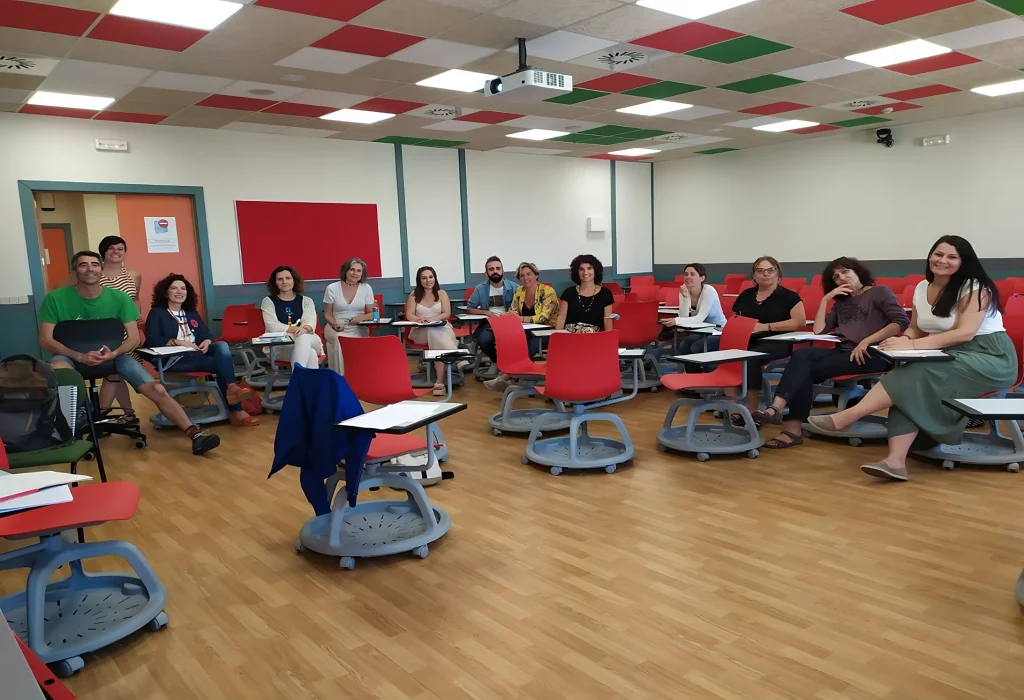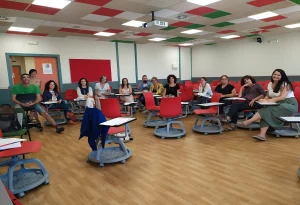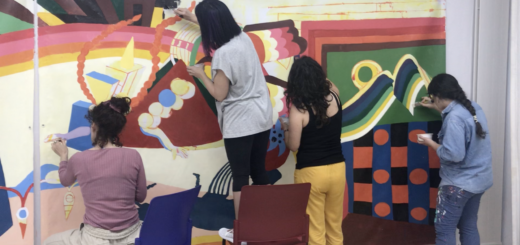Dialogues, feelings, and narratives around university classrooms participation
All these questions, and some more, have been answered by the research project financed by the UCM Student Observatory Office (2021-22 call) directed by Jon Sanz and Irene Martínez, whose main objective has been to analyse the perceptions about participation in university classrooms from a gender perspective.

Already, leading authors of critical pedagogies such as Paulo Freire, advise us of the importance of placing students at the center of the educational process, from an active position, as well as the need to rethink teaching roles and styles.
Critical, feminist and counter-hegemonic pedagogies point to participation as essential to improve the emancipatory education. All of this is a complex process in which the application of isolated techniques or tools is not enough (Martínez et al., 2020).
The Student Observatory Project (hereinafter POE) has focused on the perception of participation that students claim to have from a gender approach. Also, this project has based on the pedagogical narratives of teachers around the participation.
One of the main concerns has been to question whether teachers and students share a common framework around participation. In other words, if what the student expects from their time at the University coincides with the expectations of the teachers and, therefore, to know if both (student and teacher) give the same importance to the fact of participating in the classroom. Participation in the classroom can be understood from different approaches and perspectives: not only refers to collaboration or cooperation on the part of the student body, in a short time or limited to the mere presence in the classroom to responding (or doing) direct questions about doubts. From a social point of view, it supposes the involvement of students and teachers in individual and group dynamics, in interaction in a common space with common goals, to have the possibility of make own decisions, have the capacity to organization, planning and control, have commitment, responsibility and awareness, both individually and collectively (Martínez and Sanz, 2022).
All of this contrasts with what the majority of students point out as elements that define participation in the classroom: answering the teachers’ questions, attending class, raising doubts, looking at the teachers or being participatory in classmates’ presentations.
This project has carried out a mixed methodology based on an educational ethnography model (del Olmo, 2017; Celigueta and Solé, 2013) together with the application of a student’s questionnaire (both, with quantitative and qualitative questions). The project has been developed in several phases: 1) strengthening of the networks of interfaculty teachers (31 teachers from all areas of knowledge of the UCM); 2) analysis of the reality of the student and their dynamics of participation in the classroom, based on the questionnaire (707 students). 3) observations in the classrooms and discussion teacher groups; 4) triangulation and analysis of results; 5) write a book regarding teacher training proposals to improve participation.
We know that the participation is valued as something important for the development of university classes. Now, we want to know how this participation is and what students and teachers think about their participation. These fundamental questions are being answered in this project.
From the results about the questionnaires and the discussion groups, we found out that most of the student attends at the theoretical and practical lesson, with greater attendance at practical classes. Also, the students reveal that they are more participatory in small groups than in large ones. In relation to gender, there are significant differences: the students’ boys prefer the large groups, and the girls prefer small groups.
We notice another gender differences, for example, when we ask about the feature of a participatory person. On the one hand, men said that it is more important to have self-confidence, the knowledge of the subject, and having a good relationship with teachers. In the other hand, women perceive that it is more important to have a good personality, the small group and to have a good record.
The gender approach in this project has revealed a reality that is not easy to analyze. On the one hand, the students do not recognize gender differences in their actual participation, but, on the other hand, in the real class life these inequalities are evident. One of the student said: “I see that there are gender bias, but it seems not- because there are fewer boys, but it is true that the boys always participate in all classes and are the boys usually are the spokespersons for the groups”; Another student said: “In the laboratory, the boys are always in charge of the calculations and we are in charge of taking care of the material, making the mixtures because it requires more sensitivity of the hands.”

Finally, students and teachers shared that it is important to make a trust environment in the classroom to improve the participation. This is because, among the students think that a lack of participation is because their feel: fear, insecurity, bad judgment… All these feelings can be solved if we can make those environments of trust.
In conclusion, this POE highlights the need to question the practices of participation in university classrooms, for example: 1. students and teachers accepted the participation as an essential element for learning. Because knowledge is best acquired when it involves the student’s activity and worse if it is received passively; 2. reproduction of classic stereotypes in the classroom; 3. visibility of individual factors (when the students recognizing facilities or barriers to participation) and the invisibility of social factors (life histories, environment…); 4. importance of trust; 5. Lack of a gender approach in the reality of the classrooms.
As a proposal, we find in feminist pedagogies (hooks, 2021, Bejarano et al., 2019, Martínez et al., 2021) a necessary epistemological framework that gives environments of trust a central place in educational processes when developing horizontal participation dynamics that place the ethics of care at the center. It is committed to building critical and innovative teaching models where the participation goes beyond answering teachers’ questions or applying decontextualized tools. In addition, these reflections are directly connected with the sense of the public University and the need to form critical citizens for the Common Good. If we want involved societies, we need active Universities and, therefore, participatory classrooms.
We recommend the book that will be published in La Catarata (in January 2023) where we share a common theoretical framework around participation in the university classroom, as well as different teaching experiences at the Universidad Complutense de Madrid.
References
Bejarano Franco, M. T., Martínez Martín, I., & Blanco García, M. (2019). Coeducar hoy. Reflexiones desde las pedagogías feministas para la despatriarcalización del curriculum. Tendencias Pedagógicas, 34, 37–50. https://doi.org/10.15366/tp2019.34.004
Celigueta, G. y Solé, J. (2013). Etnografía para educadores. UOC editorial.
Del Olmo, M. (2017). Practicing ethnography. A student guide to method and methodology. University of Toronto.
Hooks, B. (2021). Enseñar a transgredir. Capitán Swing.
Martínez, I., Rabazas, T., Sanz, C. & Resa, A. (2020). La Investigación-acción participativa en la metodología docente universitaria. Una experiencia de innovación desde la perspectiva de género. Tendencias Sociales, 6, 111-132. https://doi.org/10.5944/ts.6.2020.29160
Martínez, I., Sanz, C. & Resa, A. (2021). Motivar la participación en las aulas universitarias desde las pedagogías feministas. En L. Álvaro (Eds.), Género y educación: escuela, educación no formal, familia y medios de comunicación (pp.169-173). Dykinson.
Martínez, I. y Sanz, J. (2022). Percepciones de la participación en las aulas universitarias desde un enfoque de género y de diversidades. UCM.

Authors
Irene Martínez Martín, Jon Sanz Landaluze
UCM, grupo INDUCT






